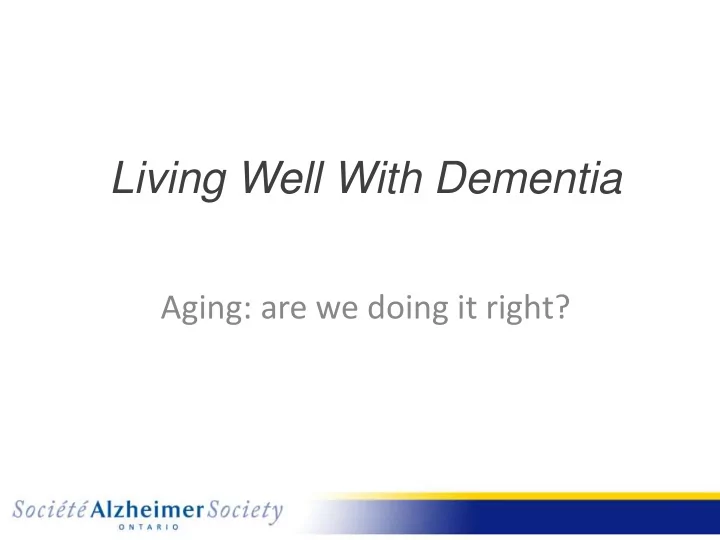

Living Well With Dementia Aging: are we doing it right?
Living Well With Dementia
A health and social priority!
Social Isolation • Defined as a low quality and quantity of contact with others • Caregivers, also isolated, lose their own sense of personhood
Most importantly … • There is a human right that people with dementia have, like anyone, should expect to live well
Time for change!
People with dementia want a voice!
See me not my disease! I’m still me!
• Dyan says …
Outcomes Important to Quality of Life: • I have personal choice and control or influence over decisions about me • I know that services are designed around me and my needs • I have support that helps me live my life
Outcomes Important to Quality of Life • I have knowledge and know-how to get what I need • I live in an enabling and supportive environment where I feel valued and understood • And I know there is research going on which delivers a better quality of life now and hope for the future
Client Advisory Committee
The Blue Umbrella
Program Focus Areas • Personal • Public Training Identifiers • Training • Community Package with Identifier tools Identify Educate Promote • Advertising • Public Exposure Redefine Awareness Campaign changing the • Posters/ Flyers face of dementia • Media
Staff and Volunteers Together
“Walk -abouts ”
Education Sessions
Identifiers
Secret Shoppers
Business response
Bobcaygeon’s Success • Small rural town, 3000 permanent residents • 50+ businesses educated • 60+ people with dementia wearing the identifier
Bobcaygeon’s Success: • Reports of improved customer services • Businesses and services want to know more • Service providers want to enhance for their own unique needs
Across the province: • 5 Local Societies now piloting Blue Umbrella • Evaluation to support more roll-out • Creation of education models for unique business and service groups
Some promising wins: • City of Cornwall • Upper Canada Village • Banks • Libraries • Faith Community
Hamilton, Toronto, Peel, Durham and York Regions
London, Ottawa, Sault Ste Marie, Huron County, Sudbury, Toronto, Grey-Bruce, Durham, Waterloo, Niagara, Perth County
Taking Control of Our Lives: A self-management program for people living with dementia Waterloo, Durham, Niagara, Perth County and Thunder Bay
Unique activities in numerous Local Alzheimer Societies – IPOD music program (Toronto, Muskoka) – Art activities (St. Thomas) – Choirs (London, Kingston) – Exercise programs (Peterborough, Hagersville) – Intergenerational activities (Lindsay) – Social get-togethers (Bobcaygeon, Brockville)
Join the movement. Sign up today! www.dementiafriends.ca Or email us to find out more at info@dementiafriends.ca Caroline Cameron Sam Roberts David Hearn
Workplace education • Designing modules for customer/client-facing staff – Retail businesses and service providers – Emergency responders – Retirement home staff – Financial institutions – Legal institutions – Municipal leaders – Community housing workers – Employers of people with dementia – Employees recently diagnosed with dementia
Dementia as a disability • What does “disease” mean to us? • What would change if we used “disability” language? • What does history show us?
Dementia Friendly
Change the environment, not the person Stigma Attitudes Inclusion Physical Social
• A dementia-friendly community is a place where people living with dementia are supported to live a high quality of life with meaning, purpose and value.
Dementia Friendly Communities • Developing a framework for a model that will bring collective impact • Multiple stakeholders focused through one model, with many different activities and outcomes, but one common vision
Dementia lens to Age-Friendly
At the end of the day, people living with dementia will: • Be more actively engaged outside of their home • Feel safer in their community • Enjoy where they live • Continue to maintain personal interests and activities
At the end of the day, people living with dementia will: • Be recognized as valuable contributors to their communities • Live longer in the home of their choice • Experience less stigma
And even more so … • Feel empowered, have higher aspirations • Maintain a higher level of independence and control • Experience personalized and integrated care as the norm
Thank you! David Webster: dwebster@alzheimeront.org
Recommend
More recommend